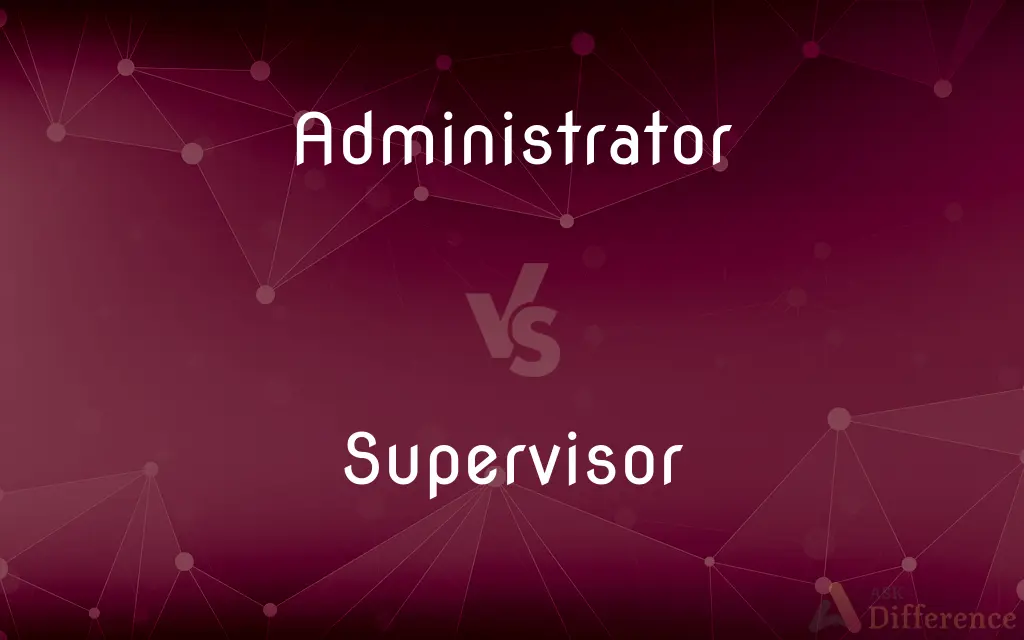Administrator vs. Supervisor — What's the Difference?
By Tayyaba Rehman & Maham Liaqat — Updated on March 30, 2024
An administrator oversees organizational policies and operations, while a supervisor directly manages the work of employees.

Difference Between Administrator and Supervisor
Table of Contents
ADVERTISEMENT
Key Differences
An administrator typically holds a role focused on the broader management and operational aspects of an organization, dealing with tasks such as policy development, planning, and oversight of administrative functions. Their role is often more strategic, involving decision-making at a higher level to ensure the organization's smooth operation. In contrast, a supervisor has a more hands-on role, directly overseeing the day-to-day work of employees, focusing on managing team performance, providing guidance, and ensuring that tasks are completed efficiently and effectively.
While administrators are concerned with the implementation and maintenance of policies and systems that govern the entire organization, supervisors are more intimately involved with the workforce, addressing immediate operational issues, solving problems, and providing direct support and feedback to employees. This distinction highlights the difference in scope and focus between the two roles, with administrators looking at the organization from a macro perspective and supervisors engaging at a micro level.
Administrators often work behind the scenes, ensuring that the organizational infrastructure is in place for the success of its operations. They may be involved in budgeting, human resources, and compliance with regulations, acting as a bridge between the organization's management and its operational needs. Supervisors, however, are on the front lines, directly interacting with staff and playing a critical role in shaping the work environment and culture, directly impacting employee satisfaction and productivity.
The skills required for each role also differ; administrators need to have a broad understanding of organizational operations, strategic planning abilities, and strong leadership skills to navigate complex administrative landscapes. Supervisors, on the other hand, require excellent interpersonal skills, the ability to manage and motivate teams, and practical problem-solving abilities to manage the daily operational challenges.
Despite these differences, both administrators and supervisors are essential for the efficient and effective operation of any organization. They must often work closely together to ensure that the strategic goals set by administrators are implemented on the ground by supervisors, who adjust strategies and tactics to meet the dynamic needs of the workforce and the tasks at hand.
ADVERTISEMENT
Comparison Chart
Focus
Organizational policies and operations
Direct management of employees' work
Role Scope
Strategic, overseeing broader aspects
Operational, focusing on day-to-day tasks
Responsibilities
Policy development, planning, oversight
Managing team performance, guidance
Interaction
With management and organizational structure
Directly with employees
Skills Required
Strategic planning, leadership
Interpersonal, team management
Compare with Definitions
Administrator
Deals with strategic planning and policy.
As an administrator, her role involved long-term planning for the organization's growth.
Supervisor
Provides immediate feedback and support to employees.
He was always available to offer guidance and support to his team.
Administrator
Focuses on overall organizational health.
The administrator implemented new policies to improve efficiency.
Supervisor
Handles conflict resolution and problem-solving.
The supervisor resolved conflicts within the team, maintaining a positive work environment.
Administrator
Oversees multiple departments or functions.
He oversaw the administrative functions across several departments.
Supervisor
Directly manages a team's daily activities.
The supervisor ensured the project was on schedule and met quality standards.
Administrator
Involved in budgeting and resource allocation.
The administrator allocated funds for new projects and initiatives.
Supervisor
Addresses performance issues and motivates staff.
She conducted performance reviews to motivate and address any issues.
Administrator
Acts as a liaison between management and operations.
She facilitated communication between the executive team and department heads.
Supervisor
Plays a key role in training and development.
He organized training sessions to enhance his team's skills and productivity.
Administrator
A person responsible for carrying out the administration of a business or organization
Hospital administrators
Supervisor
A supervisor, or also known as foreman, boss, overseer, facilitator, monitor, area coordinator, or sometimes gaffer, is the job title of a low level management position that is primarily based on authority over a worker or charge of a workplace. A supervisor can also be one of the most senior in the staff at the place of work, such as a Professor who oversees a PhD dissertation.
Administrator
A person who dispenses or administers something
Administrators of justice
Supervisor
A person who supervises a person or an activity.
Administrator
One who administers, especially one who works as a manager in a business, government agency, or school.
Supervisor
One who supervises.
Administrator
(Law) One appointed to administer an estate.
Supervisor
One who is in charge of a particular department or unit, as in a governmental agency or school system.
Administrator
One who administers affairs; one who directs, manages, executes, or dispenses, whether in civil, judicial, political, or ecclesiastical affairs; a manager
Supervisor
One who is an elected administrative officer in certain US counties and townships.
Administrator
(legal) A person who manages or settles the estate of an intestate, or of a testator when there is no competent executor; one to whom the right of administration has been committed by competent authority
Supervisor
(management) A person with the official task of overseeing the work of a person or group, or of other operations and activities.
Administrator
(computing) One who is responsible for software installation, management, information and maintenance of a computer or network
Supervisor
A person who monitors someone to make sure they comply with rules or other requirements set for them.
Administrator
One who administers affairs; one who directs, manages, executes, or dispenses, whether in civil, judicial, political, or ecclesiastical affairs; a manager.
Supervisor
(US) In certain states, an elected member of the governing body for a county which is called the board of supervisors.
Administrator
A man who manages or settles the estate of an intestate, or of a testator when there is no competent executor; one to whom the right of administration has been committed by competent authority.
Supervisor
(computing) A process responsible for managing other processes.
Administrator
Someone who administers a business
Supervisor
One who supervises; an overseer; an inspector; a superintendent; as, a supervisor of schools.
Administrator
The party appointed by a probate court to distribute the estate of someone who dies without a will or without naming an executor
Supervisor
A spectator; a looker-on.
Administrator
Someone who manages a government agency or department
Supervisor
One who supervises or has charge and direction of
Supervisor
A program that controls the execution of other programs
Common Curiosities
What are the key skills for a successful administrator?
Successful administrators typically possess strategic planning, leadership, and comprehensive understanding of organizational operations.
What is the primary difference between an administrator and a supervisor?
The primary difference is their scope of work; administrators focus on overarching organizational policies and operations, while supervisors manage the day-to-day work of employees.
What makes an effective supervisor?
Effective supervisors have strong interpersonal skills, are adept at managing and motivating teams, and excel in problem-solving and conflict resolution.
Do administrators interact with employees as much as supervisors do?
Administrators generally have less direct interaction with employees compared to supervisors, who work closely with the workforce on a daily basis.
How do administrators and supervisors contribute to organizational success?
Administrators set the strategic direction and create the framework for operations, while supervisors ensure these strategies are effectively executed at the ground level.
Can the roles of administrator and supervisor exist within the same team?
Yes, within larger teams or departments, it's common to find both roles, with administrators focusing on policy and supervisors on daily management.
Can an administrator also act as a supervisor?
Yes, in smaller organizations or specific contexts, an individual might take on both administrative and supervisory roles.
Are the roles of administrator and supervisor industry-specific?
While specific duties can vary by industry, the fundamental distinction between overseeing organizational policies and managing employee work is consistent across fields.
Is it more challenging to be an administrator or a supervisor?
The challenge in either role depends on the individual's skills and the organizational context, as both roles have unique demands and pressures.
How do supervisors handle underperforming employees?
Supervisors may provide additional training, set clear performance goals, and offer feedback to help underperforming employees improve.
How do the responsibilities of administrators and supervisors overlap?
Their responsibilities might overlap in areas like policy implementation, where supervisors execute plans devised by administrators at the operational level.
How do the goals of administrators and supervisors align within an organization?
Their goals align in aiming for the organization's success, with administrators setting the vision and supervisors ensuring it is realized through effective team management.
What educational background is required for administrators and supervisors?
Educational requirements can vary, but administrators often have degrees in business administration or related fields, while supervisors might have specialized knowledge relevant to their area of supervision.
How does one transition from a supervisory to an administrative role?
Transitioning typically involves gaining experience in organizational management, strategic planning, and developing a broader understanding of business operations.
What strategies might an administrator use to enhance organizational efficiency?
Administrators might implement new technologies, streamline processes, and develop policies that foster a more efficient and productive work environment.
Share Your Discovery

Previous Comparison
Strait vs. Inlet
Next Comparison
Adaptivity vs. AdaptabilityAuthor Spotlight
Written by
Tayyaba RehmanTayyaba Rehman is a distinguished writer, currently serving as a primary contributor to askdifference.com. As a researcher in semantics and etymology, Tayyaba's passion for the complexity of languages and their distinctions has found a perfect home on the platform. Tayyaba delves into the intricacies of language, distinguishing between commonly confused words and phrases, thereby providing clarity for readers worldwide.
Co-written by
Maham Liaqat















































